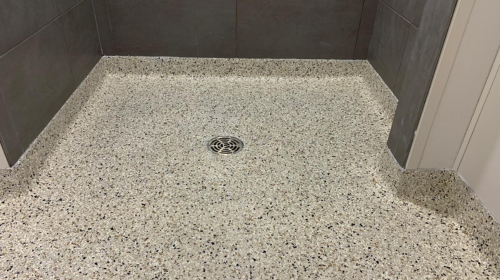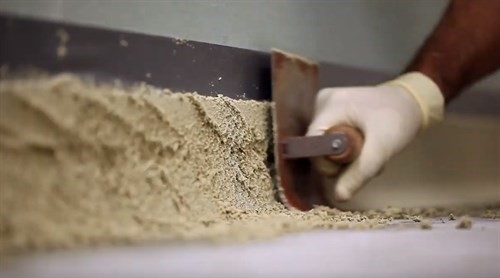WHAT IS FLOOR COVING? WITH VIDEO
There are several types of cove base categories depending on the flooring product you are using and whether the area is residential or commercial / industrial. It is important to have the most effective cove installed for your specific environment.
Floor Coving Basics
Floor coving has become increasingly popular as a flooring solution in various industries. Although it may appear to be a minor detail, incorporating coving into a space can provide numerous advantages, making it a desirable option.
Floor Coving Details
- A cove is typically either a radius in the corner of a wall or a 45-degree cant to prevent the easy buildup of dirt/debris in the corner of the wall.
- Cove bases can prevent water from going under walls and contain chemicals within the coved area in industrial spaces.
- A cove base is often required by government regulation in certain environments like food and pharmaceutical.

A cove base in a patient shower room.
Floor Coving Benefits
- Coves make cleaning procedures easier and prevent bacteria, dirt, and insects from hiding under walls.
- Coves can be effective in protecting walls from impact damage by carts and equipment.*
- A cove base is a design element that gives a space an attractive, finished look.
*In some spaces, like food processing or medical environments, pre-cast wall curbs will offer increased protection, beyond that of a cove base.
Be sure to watch our StonTalks episode ‘Understanding Resinous Floor Coves’ for more answers.
What is an Integral Cove Base?
There are several types of floor coving depending on the material being used, but when referring to seamless flooring, (such as epoxy, urethane, or methyl methacrylate), an integral cove base, sometimes referred to as a hygienic cove base, is seamless from the floor up.
With an integral cove base, the cove and flooring are combined, rather than having the coving applied to the top of the flooring material (such as with a PVC or pencil cove).
Integral cove bases are hygienic there are no seams or joints for bacteria or dirt to become trapped. A seamless flooring system with an integral cove base installed at the proper radius at its base is critical to cleanliness and hygiene in the space. Integral mortar cove bases are typically installed at a height of four inches. Two or six-inch coves may also be appropriate depending on the area.
Installing a Mortar Cove Base

Installing a mortar cove base in a food and beverage facility.
Installing an integral cove base varies from flooring system to flooring system, but the process the professional installer will follow for installing a mortar-based cove for your commercial or industrial facility is as follows:
- The wall surface must be clean and dry with a firm backing. There should be no movement or gaps at the base where wall substrate meets the floor.
- Hang the cove strip at the desired height of coving.
- Prime the vertical portion of the wall and part of the floor.
- Mix the mortar.
- Hock the mortar up on the wall using a flat trowel and leave some material at the base to form the radius.
- Utilize a special cove trowel to trowel and compact the material and form the radius.
- Allow to cure.
- Coat with proper sealers or coatings.
Cleaning Integral Floor Cove
Integral floor coves are typically cleaned at the same time the floor is being cleaned, using a mop or rags/wipes for the cove base specifically. The same cleaners used on the floor can be used on the coves.
Are Mortar Cove Bases the Best Hygienic Protection for My Facility?
Integral mortar coving offers excellent hygienic protection for facilities as it is seamless from the floor up. However, some facilities such as food processing or pharmaceutical processing can benefit from going a step beyond this.
Because these facilities are at risk for shutdowns and recalls due to contamination and high-pressure washdowns, along with other abusive day-to-day operations, these businesses are turning to prefabricated, polymer-composite curbs. These chemical-resistant curbs are superior to standard concrete curbs and offer protection against forklift damage.
Stonhard has been manufacturing and installing seamless flooring systems for more than a century. Stonhard currently has HACCP International Certification on six flooring products used within the food & beverage industry. Stonhard has a partner with a world-leading producer of EHEDG-certified, stainless steel, hygienic drainage systems to provide our customers with the most complete, hygienic solutions available.
Stonhard is the exclusive provider of EHEDG-certified hygienic curbs to offer the best solutions to our food & beverage clients. This partner is the leading producer of hygienic wall protection for the food and beverage industry, manufactures prefabricated, polymer composite curbs to provide wall protection at a higher level than those composed of concrete. Both Stonhard floors and the curbs are chemical resistant, water resistant and easy to clean.
Contact us to get high quality, seamless floor coving professionally installed in your space!